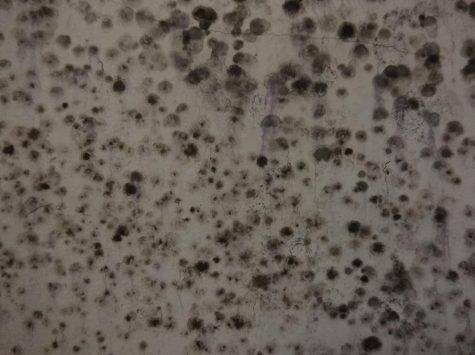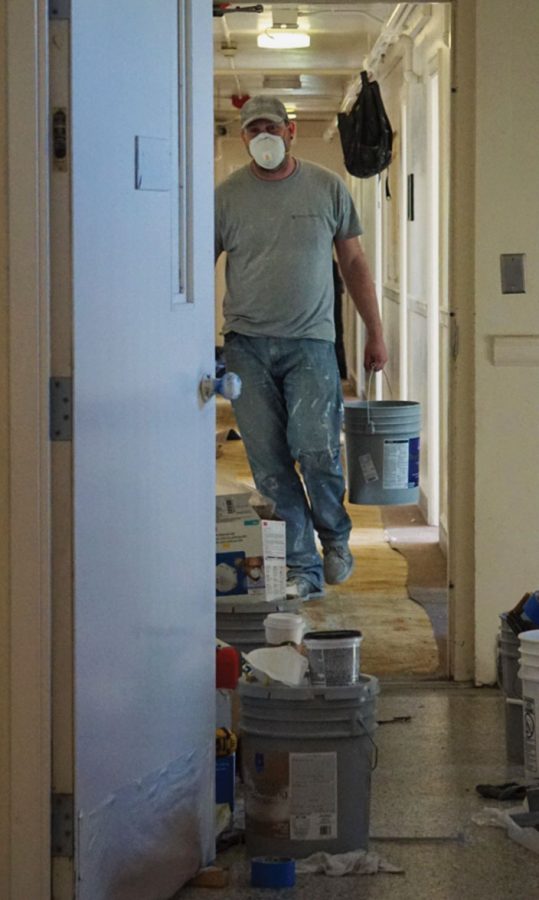Workers raise concerns over conditions of Waller Hall
Employees claim bleeding from ears, noses, WSU said it hasn’t received such injury reports
ANA MARIA ALANIZ MENDOZA | THE DAILY EVERGREEN
Workers inside Waller Hall move to repair the interior of the dormitory Wednesday in preparation for a record freshman class.
June 28, 2018
WSU will reopen Waller Hall this fall to house the largest freshman class in school history.
A projected incoming class of over 4,300 students looking for on-campus housing caused the need for Waller Hall, which closed after the spring 2015 semester, to reopen, Phil Weiler, vice president of marketing and communications at WSU, said.
Along with the high enrollment, the level of achievement in the class should be high, he said.
“It’s something that’s really quite exciting,” Weiler said. “One of the things that is particularly nice is not only are we seeing a record number of incoming freshman, but it looks like the academic quality of the class is unprecedented as well.”
In order to house this high number of incoming students, the previously unused hall, which opened in the 1930s as an all-male dormitory, will be renovated and reopened. In addition to this extra space, WSU has informed non-freshman students who applied to live in residence halls that they have been placed on a waitlist and other places such as Orton Hall will be expanded to double rooms instead of singles, Weiler said.
The school may also explore offering students the opportunity to have three members in a room to help alleviate costs, he said, but no final decision has been made on room occupancy numbers in this respect.
Housing crews, some of which are made up of students to carry out tasks such as repainting walls, have been working on Waller for the past few weeks to bring the building back to acceptable living standards, Terry Boston, associate vice president for finance and operations for Student Affairs at WSU, said.
However, the working conditions in Waller have caused some to fall ill with ailments such as bloody noses and ears, respiratory issues and nausea, Kayla Simonson, a WSU student working in Waller Hall for housing maintenance as a painter, said. Simonson was a reporter for the Life section at the Evergreen during the 2017 fall semester.
“When I posted my Twitter post they called me into the office,” she said. “They didn’t tell me to take it down but you can tell they weren’t happy about it. They were pretty rude about it.”
Simonson, who posted a tweet with pictures of what appears to be mold and mushrooms on a wall in Waller, also said some of the floors were damaged. Other employees working on the site who asked not to be named to avoid problems with employment said they observed the same issues.

A photo of what appears to be mold on a wall in Waller Hall during renovation work.
WSU Pullman responded to her tweet, thanking her for posting the photos and stating, “to reopen Waller Hall, we are cleaning [and] repairing the interior, thoroughly inspecting the building from top to bottom, and installing carpets [and] new furniture in all the rooms.”
Simonson also claimed the sickness was “widespread,” and that at least some of the affected employees had went forward with their issues.
When the Evergreen informed Weiler of the allegations made by Simonson, he called the claims “shocking.”
He said the building had underwent an air quality test showing the building was safe to work in, and Environmental Health and Safety Assistant Director Shawn Ringo said the results stated the air was comparable to outdoor air.
“It’s shocking to me that people would not report that kind of problem,” Ringo said.
In response to the allegations, Weiler offered the Evergreen a tour of the building accompanied by Ringo, Boston and Mark LaBolle, director of housing and dining maintenance services.
During the tour, Ringo said the first issue they addressed was the mold present in the building. He also said it is typical for a building to have mold after being shut down for an extended period of time.
LaBolle said the area with black mold was a private area they closed off to workers and that WSU quickly contacted IRS Environmental of Spokane to repair the affected areas.
The group also showed the Evergreen the room where the photo of the mushrooms growing out of a wall were taken to show the problem had been taken care of and that no mushrooms still existed in the area.
Boston confirmed that a worker had contracted bronchitis, but said the worker decided to return to Waller Hall after they healed despite being offered relocation to a different worksite.
The Evergreen was unable to confirm whether the bronchitis was caused by working in Waller Hall. One person who had chronic respiratory issues did take the opportunity to change locations, Boston said.
As for the claims of workers bleeding or suffering other ailments, Ringo said the university goes off incident reports filed by workers to their supervisors and if reports aren’t filed it is difficult for action to be taken.
Ringo also said they were not aware of any reports of the ailments Simonson and others claimed were present with employees on the site. However, he said the latex paint used in the hall may cause those with a latex-allergy to experience symptoms as they work with the substance.
LaBolle said if they discovered a supervisor had ignored a report regarding workplace safety, it would present a “major issue.”
Weiler said employees should not be afraid to report their safety concerns to a superior.
“People should never sit on that information if they have concerns,” Weiler said.
Waller Hall is on schedule to open to students on Aug. 11, the university’s move-in day, LaBolle said.
The unexpected opening of Waller may cause some planned work around campus to be delayed, he added.
“Now a lot of things are not going to get done,” LaBolle said.
This story has been updated to reflect that Simonson was a reporter for the Life section at the Evergreen during the 2017 fall semester.











